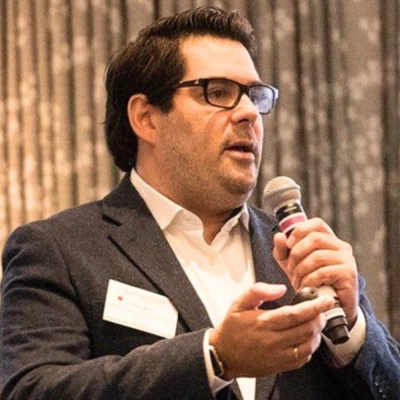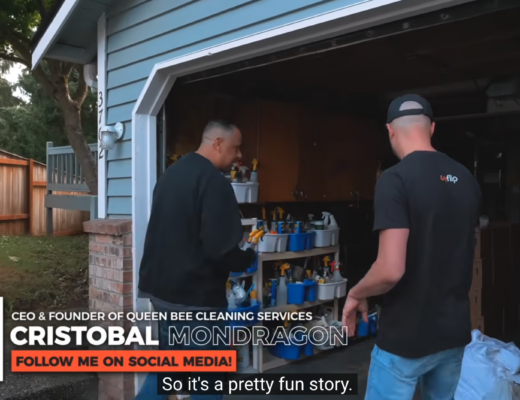How to Stay Motivated as an Entrepreneur: 18 Strategies
Staying motivated as an entrepreneur can be challenging, but it’s crucial for long-term success. We asked industry experts to share one strategy they used to stay motivated and maintain momentum during challenging times as an entrepreneur — and how others can replicate their approach. Discover practical approaches that will help you maintain focus and drive in your entrepreneurial journey.
- Anchor Vision to Daily Wins
- Focus on Small, Consistent Progress
- Build Mental Resilience Through Visualization
- Ship Something Real Every 48 Hours
- Use Crisis as a Reset Button
- Compare Yourself to Your Past Self
- Create a Mission File for Inspiration
- Design Work Rhythms Around Steadiness
- Tackle the Next Actionable Step
- Document and Revisit Initial Achievements
- Take Phone-Free Walks for Clarity
- Leverage Word-of-Mouth for Motivation
- Break Challenges into Achievable Goals
- Cultivate Discipline Over Fleeting Motivation
- Lean on Your Team During Difficulties
- Ground Yourself in Purpose and Progress
- Transform Big Goals into Small Steps
- Maintain Routine and Focus on Progress
Anchor Vision to Daily Wins
One strategy that has consistently kept me motivated through challenging times is reminding myself of the long-term vision and anchoring it to small, daily wins. When you’re building a business, especially in the consulting and technology space, challenges come at you from every angle: delayed projects, difficult clients, financial pressures, and the weight of leadership. What got me through wasn’t just discipline, but consciously reconnecting with “why I started” and breaking that vision into manageable steps.
A real example: When we first launched, I was coming off years of working at Bloomberg and Cargill, and I was used to the stability and resources of established organizations. Suddenly, I was wearing every hat: consultant, marketer, recruiter, and even accountant. There was a moment when a major deal we were counting on fell through, and I questioned if I had made the right decision to leave corporate. Instead of spiraling, I went back to the basics. I wrote down three small, achievable goals for the week, things I could control, like reaching out to five past clients, refining our Salesforce integration pitch deck, and dedicating two hours to mentoring my team. Hitting those small wins gave me back a sense of momentum and reminded me that progress, no matter how incremental, compounds over time.
The lesson I share with other entrepreneurs is this: during tough times, don’t let the big picture overwhelm you. Keep your vision in mind, but translate it into actionable, daily steps that are within your control. Motivation isn’t about waiting for inspiration; it’s about creating momentum by stacking small victories until confidence returns.
If you can learn to trust that process, you’ll not only survive the difficult seasons but come out with a stronger mindset and a more resilient business.
 Thiago Terzi
Thiago Terzi
Co-Founder, dgt27.com
Focus on Small, Consistent Progress
One strategy that kept me going during challenging times was focusing on small wins rather than big ones. During the early days of creating my business, there were many moving parts to put together. Additionally, finding the right people to assist with the work wasn’t easy, and progress was too slow.
That’s when I decided to focus on consistent daily progress. For instance, instead of worrying about how to beat the established competitors, I set small milestones like adding and testing one feature at a time, creating one page a day, and onboarding a single user at a time.
This approach helped me build momentum because I shifted focus from perfection to progress. Within weeks, the tiny steps transitioned into considerable growth.
How you can replicate the same approach:
1. Define a key task you can do today to achieve your biggest goal and move the business forward
2. Track and celebrate progress weekly; it’ll encourage you to move forward
3. Look at setbacks as vital data to help you improve, rather than failures
You build momentum through small, daily steps. That’s what makes you resilient.
 Sai Rahul
Sai Rahul
Founder, Niche Traffic Kit
Build Mental Resilience Through Visualization
I think the word motivation is overrated. I think we should rather use something like mental resilience or mental stability. Because motivation, I always look at it as something similar to inspiration. And it’s impossible to get inspired and motivated every single day. I would actually say I feel demotivated almost every day. There are only certain days when I feel inspired and get that extra boost of energy to do things.
For me, mental resilience has always been part of my personality. I never really had to develop it. What kept me afloat was the fact that I was always visualizing success, which brought me a huge amount of positive emotions. Those positive emotions allowed me to fall asleep even when times were hard and anxiety was rising. I would always imagine a positive outcome.
I also have this trait where I deprioritize everything that isn’t related to my goal. I learned this in sports. For example, if you have training early in the morning and another in the afternoon, and the day before someone asks you to go out, it’s not even an option. You don’t consider it a trade-off. You just say, “I can’t go, I have training tomorrow.” That kind of mentality keeps you resilient. You’re simply focused on the goal and you don’t think about anything else.
The hardest part is convincing yourself that what you’re doing is right. A lot of anxiety, breakdowns, and what people call loss of motivation come from the realization that you’re failing. There needs to be a healthy balance between recognizing a true failure versus seeing it as just another iteration that hasn’t worked out yet. Sometimes you fail because it’s genuinely the wrong path, but other times you just haven’t tried enough times to succeed.
So I wouldn’t say, “just do this no matter what.” You have to be reasonable and use common sense to figure out whether a failure is final or just temporary. That’s why it’s not about motivation. It’s about mental resilience. It’s about building your whole lifestyle around the goal you’re aiming for, and it’s about convincing yourself that success is inevitable — or at least defining clear failure criteria so you know when to stop and move on without wasting more time and energy.
 Jeff Tilley
Jeff Tilley
Founder & CEO, Muncly
Ship Something Real Every 48 Hours
Honestly, I’ve never trusted vision boards or “motivation hacks” to get work shipped when pressure is high. What’s worked for me is much simpler: I run in 12-week blocks, and every 48 hours someone has to ship something real.
That might be a Salesforce sandbox demo, a quick decision memo on an integration choice, or even just a customer note that captures adoption feedback. We log it, track the streak, and tie it to three signals that actually matter for momentum: customer conversations, deploys, and time-to-decision.
When momentum dips (and it always does), it’s harder to stall when everyone can see whether the streak is alive or broken.
If you want to try this yourself:
- Break big goals into doable, two-day deliverables
- Anchor everything to 2-3 leading indicators that matter for your business
- Track them publicly (a WhatsApp group works better than a CRM)
 Mathieu Sroussi
Mathieu Sroussi
Founder and Executive, SmartenUp
Use Crisis as a Reset Button
One of the most powerful strategies that has helped me stay motivated during times of crisis is rooted in a simple but essential mindset: every crisis eventually ends. It may not feel that way in the middle of it when uncertainty is at its peak, when markets are collapsing, or when you feel your business might not survive the month. But history shows us that even the most difficult times, whether global recessions or long-lasting conflicts, come to a close. Reminding myself of this truth gave me strength to focus not on panic, but on preparation.
What I learned is that a crisis is not only a test of resilience. It is also a unique opportunity for reflection and transformation. During these periods, when external growth slows down, I see it as the perfect time for what I call a “moral and operational audit.” I revisit processes, reassess priorities, and optimize workflows that would otherwise get buried under the speed of business as usual. Sometimes this means restructuring teams, sometimes cleaning up outdated systems, sometimes simply pausing to evaluate if our culture and values are still aligned with the reality of the market.
For other entrepreneurs, my advice is simple: do not let a crisis paralyze you. Use it as a reset button. Take advantage of the extra time and slower pace to build a stronger, leaner, more resilient version of your company. Because when recovery inevitably comes, you’ll be ready not just to survive, but to accelerate.
 Daria Leshchenko
Daria Leshchenko
CEO and Managing Partner, SupportYourApp
Compare Yourself to Your Past Self
What keeps me going: I stopped comparing myself to other people because you never know what advantages they started with.
That person who seems to have it all figured out? Maybe their parents paid for everything. Maybe they had connections you don’t have. Maybe they’ve been doing this for 10 years and just never talk about the early struggles.
You’re seeing their highlight reel and comparing it to your behind-the-scenes footage.
The real shift: I focus on where I was two years ago versus where I am now. Two years ago, I couldn’t have predicted any of this. That gives me hope that two years from now, I’ll be somewhere I can’t even imagine right now.
What actually helps: Being more open to learning and admitting when I’m wrong. I used to get defensive about feedback…now I actually want to hear it because it makes things easier.
Bottom line: Your only real competition is who you were yesterday. Everyone else is playing a different game with different rules and different starting points.
You have to stop trying to figure out how they did it and focus on what actually works for your situation.
 Chandler Tue
Chandler Tue
Freelancer
Create a Mission File for Inspiration
Like most entrepreneurs, I have certainly faced my fair share of tough stretches, particularly when progress felt slow and obstacles felt much bigger than they ended up being.
A very simple strategy that my mentor shared with me a few years back was zooming out to focus on long-term impact instead of short-term outcomes. It is also important as an entrepreneur and business owner, especially in the tech or SaaS industry, to remember why you do what you do. Reflecting on past wins and customer success stories and reading about how our platform helped real teams hit their goals allows you to keep a good head on your shoulders, stay motivated, and help yourself slowly transition out of more trying times. For me personally, this approach grounded me in why we do what we do, which made the short-term challenges feel more manageable.
Other entrepreneurs can replicate this by creating their own “mission file” — like a collection of customer stories, team wins, or even personal notes that remind you of your bigger vision. To me, it is such a simple but powerful way to reset your mindset.
 Chris Sorensen
Chris Sorensen
CEO, PhoneBurner
Design Work Rhythms Around Steadiness
During my entrepreneurial journey, I discovered that treating my nervous system as my greatest business asset was key to maintaining momentum through challenges. After initially falling into the trap of constant hustle, I realized burnout wasn’t a badge of honor but actually impeded my growth and sustainability. I now recommend entrepreneurs intentionally design their work rhythms around steadiness and capacity rather than exhaustion, which paradoxically creates more consistent progress and motivation in the long run. This approach can be replicated by regularly assessing your energy levels and restructuring workflows to honor your natural capacity instead of pushing beyond it.
 Karen Canham
Karen Canham
Entrepreneur/Board Certified Health and Wellness Coach, Karen Ann Wellness
Tackle the Next Actionable Step
When I first started out as an entrepreneur, I encountered many unexpected challenges. Each problem seemed to pile on top of the other, stretching my efforts thin and preventing me from fully completing any single task. The weight of these unfinished responsibilities made it easy to feel stuck and unproductive.
To overcome this, I shifted my mindset and stopped focusing on the overwhelming bigger picture. Instead, I concentrated on tackling the next actionable step in front of me. This simple but effective approach helped me maintain momentum, creating a steady sense of accomplishment and keeping me motivated even during the most difficult seasons.
You could replicate this process by setting weekly micro-goals that directly contribute to long-term objectives. If you’re working in a team, you can consider pairing these with a reward system, acknowledging wins in a journal, or sharing progress with a mentor or team.
 Wan Ting Tan
Wan Ting Tan
Owner of Springboard, SpringBoard
Document and Revisit Initial Achievements
I return to my initial launch notes, which contain first screenshots, pitch decks, and initial small achievements during difficult times. Reading past messages from myself becomes a powerful emotional boost that surpasses any motivational quote.
Begin documenting your initial entrepreneurial efforts at this moment to achieve the same results. Document your work progress by saving drafts and take screenshots of your first Stripe payment notification. Celebrate every minor achievement. The archive serves as motivation during difficult times because seeing your past accomplishments will help you regain your momentum.
 Vincent Carrié
Vincent Carrié
CEO, Purple Media
Take Phone-Free Walks for Clarity
One of the most valuable habits I’ve built as an entrepreneur is taking phone-free walks with no agenda. Stepping outside without distractions isn’t just a break, but it’s often when the best ideas surface because the mind finally has room to connect dots. I come back more focused, more energized, and often with a creative solution I wouldn’t have found behind a desk. It’s a simple habit, but it elevates the quality of your thinking.
 Manoj Kumar
Manoj Kumar
Founder & CEO, HypeTribe
Leverage Word-of-Mouth for Motivation
Staying motivated as an entrepreneur is a constant challenge. For me, the secret was word-of-mouth. Receiving good user feedback always motivated me to create products people would actually love and talk about.
For example, when we started, the biggest hurdle was earning a reputation and attracting customers. We leaned into networking by sharing our merchandise with friends, who then shared it with their friends, and so on. We focused on three things: premium quality, professional branding, and a personalized approach. This created a domino effect of trust and positive buzz, and soon, orders started rolling in consistently.
So, when times get tough, focus on creating something of such high quality that it will eventually speak for itself.
 Sandra Bondare
Sandra Bondare
Co-Founder and VP of Fashion, Swag42
Break Challenges into Achievable Goals
I see challenges as hidden opportunities, moments that test us and bring out real leadership.
One thing that worked for me to stay motivated during tough times was to focus on progress over perfection.
In my early days, there were times when projects didn’t go as planned and scaling globally was tough. Instead of being paralyzed by setbacks, I broke challenges into small and achievable goals and celebrated every small win with my team. This created a positive mindset and motivated me to do more after every small win. Plus, I took ideas and solutions from my team, which helped me to see the problem from a different perspective and get a better outcome.
My advice is simple: be consistent and stay connected to your purpose. Celebrate your small wins and have supportive people around you who uplift you to do great work.
Challenges are not stop signs; they’re stepping stones to growth.
 Devubha Manek
Devubha Manek
CEO & Managing Director, ManekTech
Cultivate Discipline Over Fleeting Motivation
As a business owner, I can tell you that you cannot rely on motivation. Motivation is an emotion, and emotions come and go. This is natural and something you should expect. Discipline is what has allowed me to work late into the night while abroad on holiday, when client deadlines are approaching and no one else is available to do the top-level work that’s required. Good and bad times will come and go just as motivation will, but if you want to succeed in business, the greatest strategy is to cultivate a long-term, discipline-led lifestyle.
That being said, it’s important to remember your mental health; we’re not machines. Always remember to treat yourself whenever you can. Every time I’m at the weekend spa, I can’t help but think that it’s all worthwhile. Remembering that does wonders for me.
 Phil Pearce
Phil Pearce
Founder, CEO & Analytics Director, MeasureMinds
Lean on Your Team During Difficulties
During challenging times, I lean on the people around me. My inclination is often to turn inward when facing challenges so that I can face them alone and try to be extra focused. However, I’ve simply learned through experience that facing challenges alone never gets you the results you want. When you lean on your team, they can help you in more ways than you may even anticipate. They might have ideas that never crossed your mind, for example. So, to other entrepreneurs, that’s what I would advise — lean on your team in challenging times (and return the favor when they face challenges of their own).
 Rassan Grant
Rassan Grant
Founder, Norstone
Ground Yourself in Purpose and Progress
During challenging times, I leaned on our core mission of making pet care stress-free for families as my anchor. Reconnecting with the “why” behind my business kept me motivated. I also broke big goals into smaller milestones to celebrate progress. Other entrepreneurs can replicate this by grounding themselves in purpose and focusing on achievable wins.
 Skandashree Bali
Skandashree Bali
CEO & Co-Founder, Pawland – Award Winning Pet Care Company in UAE
Transform Big Goals into Small Steps
One strategy I use in difficult times as an entrepreneur is to turn big goals into small attainable steps. When situations become overwhelming, you can quickly lose motivation because your idea of success can seem far off. By focusing on the next task, you are creating small wins while maintaining motivation. Each small win also builds confidence.
Another important part of this approach is routine. I set specific times each day to review progress. I adjust priorities and see what was accomplished. This action instills a sense of control and reduces the anxiety that emerges from “not knowing.” It also gives me a solid plan for the next day.
Others can replicate this by determining one or two small actions they can do every day. These actions eventually lead to completing their larger goal. Noting these actions down and checking them off may seem trivial. However, it creates psychological gratification that maintains motivation.
Difficult times will always test our patience and our attention. The more we focus on smaller steps, the less impossible challenges will feel. Through regular routines, we transform uncertainty and chaos into consistent progress. That consistent rhythm motivates us. If a new challenge arises, we can adapt and respond accordingly.
 Gianluca Ferruggia
Gianluca Ferruggia
General Manager, DesignRush
Maintain Routine and Focus on Progress
Motivation will always fluctuate, so relying on it to complete work is not the most effective approach. My ONE strategy for tackling challenging times is monotasking. Many people create endless lists that consume time in their creation and demoralize them when they fail to complete all items. I prefer to focus on ONE main task, typically the most important and challenging one, and then do nothing else except that task.
Do other tasks suffer? Yes, but only in the short term. What happens is that when you tackle the one thing that’s the hardest to do, you suddenly feel a weight lifted from your shoulders, enabling you to complete all the remaining tasks much faster.
I call this “eating the frog,” and it should be done early in the morning, especially before opening any emails or answering any phone calls.
 Jeffrey Calderon
Jeffrey Calderon
President, Permits In No Time Inc.







